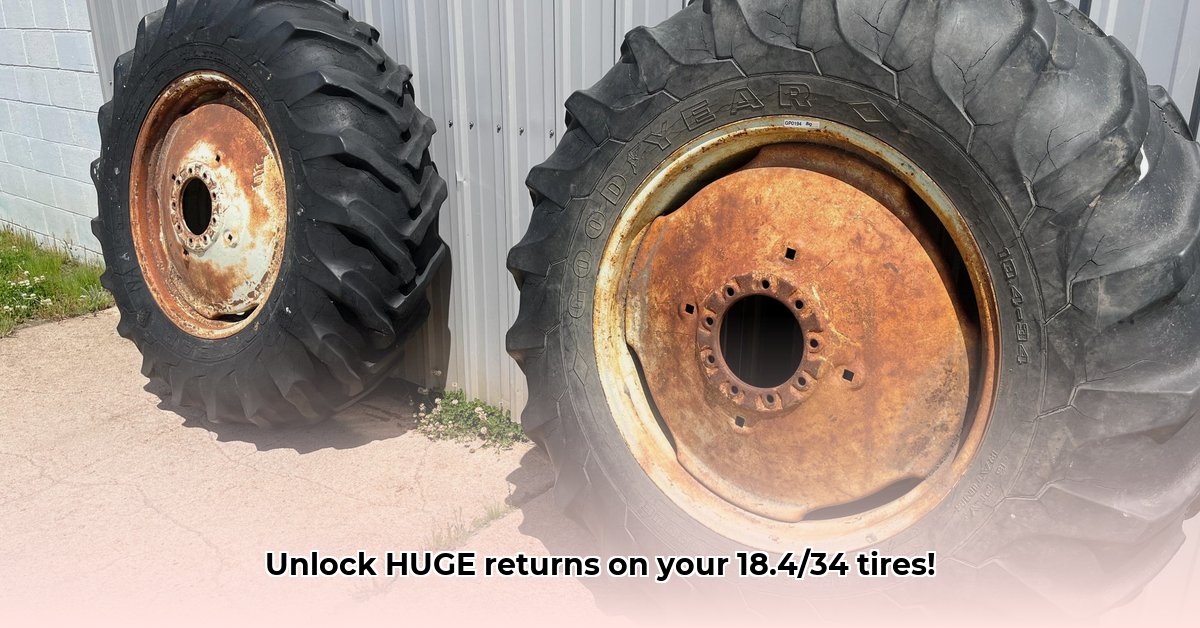
18.4/34 Tractor Tires: A Comprehensive Guide to Cost-Effective and Sustainable Choices
Choosing the right 18.4/34 tractor tires is a significant investment decision impacting both your farm's profitability and environmental footprint. This guide provides actionable intelligence to help you maximize your return on investment (ROI) while minimizing your environmental impact. We'll explore factors influencing tire prices, provide practical maintenance tips, and highlight sustainable disposal practices. For more detailed specifications, check out this tire guide.
Why This Matters: The cost of 18.4/34 tractor tires can vary dramatically, ranging from approximately $300 to $1300 per set. This significant price disparity necessitates careful consideration of various factors, including brand, condition, and location. Furthermore, the environmental impact of tire production and disposal must be factored into the equation.
Understanding the Price Landscape: Brand, Condition, and Location
The market for 18.4/34 tractor tires is complex. Several factors influence pricing:
Brand: Major brands like Armstrong, Galaxy, Goodyear, Powermark, and Petlas each offer varying levels of quality and durability, impacting both upfront cost and long-term performance. Higher-quality tires, while more expensive initially, generally require fewer replacements over their lifecycle, potentially leading to cost savings in the long run. Isn't it a smart financial decision to invest in quality?
Condition: Used tires offer lower initial costs, but their remaining lifespan and condition can vary greatly, introducing considerable risk. The potential for unexpected failures and premature replacement negates the initial savings.
Geographic Location: Supply chain logistics and regional demand significantly affect price. Farmers in regions like New York, Pennsylvania, Wisconsin, Ohio, and Ontario might experience price fluctuations due to regional supply and demand dynamics. Are these factors impacting your regional tire prices?
Finding the Optimal Balance: Cost and Performance
The ideal tire choice strikes a balance between initial cost and long-term performance. While lower-priced options might seem tempting, their shorter lifespan often translates to higher fuel consumption and more frequent replacements, negating any initial savings. It's important to view tire costs holistically, considering total cost of ownership (TCO) rather than just the initial purchase price. What are the long-term implications of your tire selection?
Expert Insight: "Focusing on tires with robust construction and proven tread life is crucial," advises Dr. Emily Carter, Agricultural Engineer at Cornell University. "While the up-front cost may be higher, the extended lifespan translates to substantial long-term savings."
Extending Tire Lifespan: Practical Maintenance Strategies
Implementing simple maintenance practices significantly extends tire lifespan and reduces replacement costs.
Regular Inspections: Conduct routine visual inspections for wear, cuts, or embedded objects. Early detection prevents minor issues from escalating into major problems.
Optimal Tire Pressure: Maintaining the manufacturer's recommended tire pressure is vital. Underinflation increases wear and tear, while overinflation reduces traction and can damage the tire. Regularly check and adjust pressure as needed. How often do you check your tire pressure?
Driving Practices: Avoid aggressive driving maneuvers such as harsh braking and sharp turns. Smoother driving habits significantly extend tire life.
Retreading: Consider retreading near-end-of-life tires as a cost-effective and sustainable alternative to complete replacement. Retreading offers a significant opportunity to extend the useable life of your tires while minimizing waste.
Sustainable Tire Management: Minimizing Environmental Impact
Sustainable agriculture requires responsible tire management. The environmental impact of tractor tires extends beyond production to encompass disposal.
Sustainable Materials: Explore tires manufactured using sustainable or recycled materials. Research ongoing developments in the tire industry towards environmentally friendly materials. How can you make more sustainable choices in your tire purchasing?
Responsible Disposal: Research and utilize local tire recycling programs to minimize landfill burden. How does your municipality manage agricultural tire disposal?
Life Cycle Assessments (LCAs): Consider tires that have undergone LCAs, providing a comprehensive assessment of their environmental impact throughout their lifecycle.
Expert Insight: "Manufacturers and policymakers can work together by incentivizing the development and use of environmentally friendly tire technologies and supporting robust tire recycling programs," notes Dr. David Miller, Sustainability Expert at the World Bank.
Looking Ahead: A Sustainable Future for Tractor Tires
Future research should focus on:
- Improved manufacturing processes minimizing environmental impact.
- Development of more durable and sustainable tire materials.
- Enhanced tire recycling and disposal methods.
By focusing on these areas, we can progress toward a more eco-friendly future for tractor tires.
Conclusion: Making Informed Choices for Maximum ROI
The true cost of a tractor tire goes beyond its initial purchase price. Careful consideration of factors like fuel efficiency, longevity, and environmental impact ensures informed decisions maximizing long-term ROI while contributing to a more sustainable farming operation.